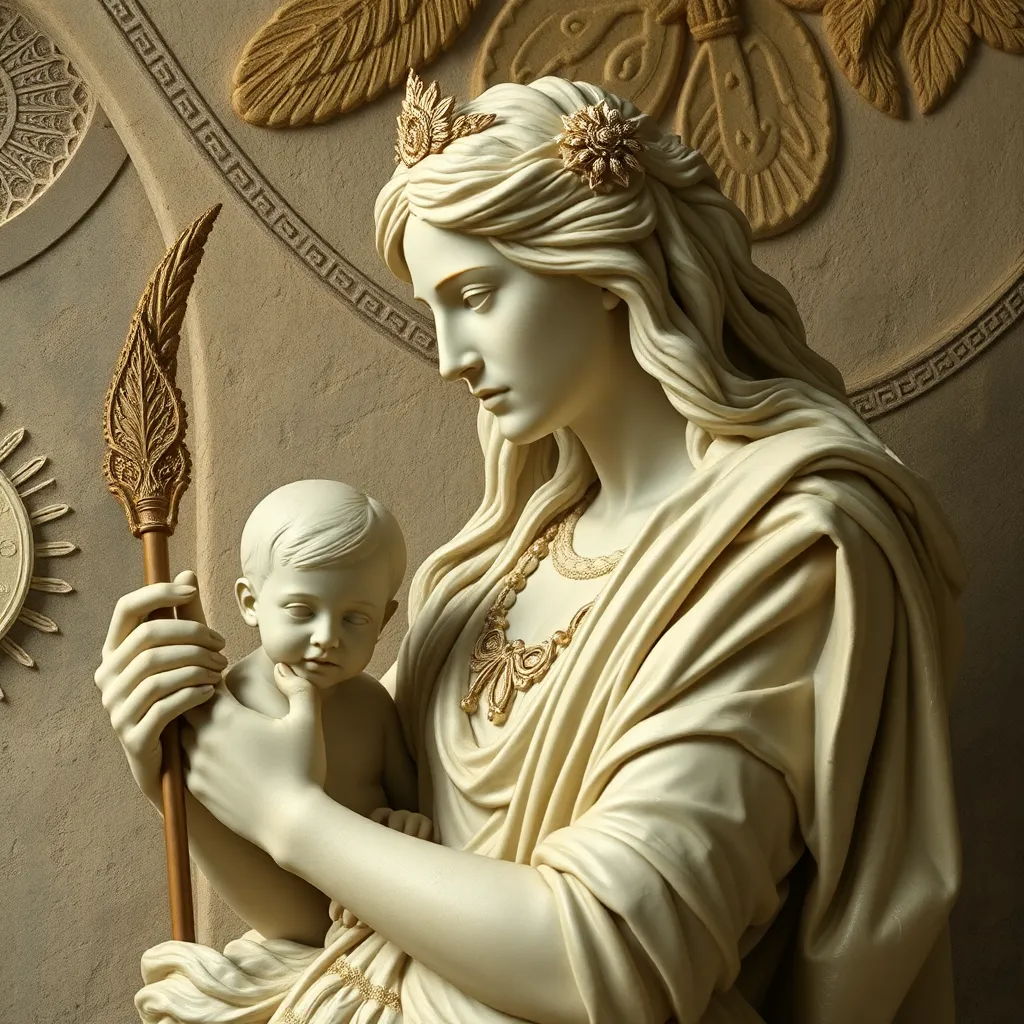The Role of Demeter in the Family: Exploring Her Maternal Aspects
I. Introduction
Demeter, the ancient Greek goddess of agriculture and fertility, holds a prominent place in Greek mythology. She is revered not only for her role in the growth of crops and the sustenance of life but also for her deep maternal instincts and connections. Maternal figures have always been significant in ancient cultures, representing nurturing, protection, and the continuity of family lineage. This article aims to explore Demeter’s maternal aspects and their relevance to family dynamics, emphasizing her influence on nurturing and familial bonds.
II. Demeter: The Goddess of Agriculture and Fertility
Historically, Demeter was worshipped extensively in ancient Greece, particularly during the Eleusinian Mysteries, which celebrated the cycle of life and death through agriculture. She was seen as a vital force behind the fertility of the earth, enabling families to thrive through abundant harvests.
The connection between agriculture, fertility, and family sustenance is profound. In ancient times, the well-being of families was directly linked to agricultural success. As such, Demeter symbolized not just the fertility of the land but also the nurturing aspect of family life. Her role as a provider made her an essential figure in the everyday lives of the ancient Greeks.
Demeter’s symbolism relates closely to nurturing and growth. She is often depicted holding sheaves of wheat or surrounded by blooming crops, which represent not only physical nourishment but also emotional and spiritual sustenance for families.
III. Maternal Archetypes in Mythology
In the realm of mythology, Demeter can be compared to other maternal figures, such as Rhea, the mother of the gods, and Gaia, the personification of the Earth. Each of these figures embodies different aspects of motherhood, yet Demeter stands out for her profound connection to the agricultural cycle and her personal relationship with her daughter, Persephone.
The concept of the Mother Goddess is prevalent in various cultures, representing fertility, creation, and nurturing. From Isis in Egyptian mythology to the Virgin Mary in Christianity, maternal archetypes serve to illustrate the importance of motherhood across civilizations. However, Demeter’s unique characteristics as a maternal archetype include her fierce protectiveness over her daughter and her embodiment of the cyclical nature of life and death.
IV. The Mother-Daughter Relationship: Demeter and Persephone
The relationship between Demeter and her daughter Persephone is one of the most poignant stories in Greek mythology. According to myth, Persephone was abducted by Hades, the god of the Underworld, leading to Demeter’s profound grief and anger, which caused the earth to become barren.
This myth encapsulates themes of separation, loss, and reunion. Demeter’s search for Persephone highlights the lengths to which a mother will go to protect and reunite with her child. The eventual reunion of Demeter and Persephone, celebrated through the changing seasons, symbolizes hope and renewal, reinforcing the strength of maternal bonds within family structures.
V. Demeter’s Influence on Family Dynamics
Demeter’s role in nurturing and care is vital for family well-being. She represents unconditional love and sacrifice, demonstrating how a mother’s devotion can shape family dynamics. Demeter’s influence is evident in the values of care, sustenance, and protection that are essential for family cohesion and stability.
- Nourishment: Just as Demeter provides for the earth, mothers today continue to nourish their families emotionally and physically.
- Unconditional Love: Demeter’s love for Persephone exemplifies the deep, protective love that mothers have for their children.
- Family Traditions: The rituals surrounding the harvest can be seen as a reflection of family gatherings and shared values that strengthen bonds.
VI. Lessons from Demeter for Modern Families
In contemporary parenting, the lessons from Demeter’s story are immensely valuable. The importance of nurturing cannot be overstated, as it lays the foundation for healthy emotional development in children. Balancing work and family life, as Demeter did while managing her responsibilities as a goddess, provides insights for modern parents who often juggle multiple roles.
Moreover, building resilience in families through maternal care is crucial. Just as Demeter navigated her grief and ultimately found a way to celebrate the return of Persephone, today’s families can learn to embrace challenges and cultivate strength through love and support.
VII. Cultural Representations of Demeter
Demeter’s image has been represented in various forms of art, literature, and popular culture throughout history. From ancient pottery depicting her and Persephone to modern adaptations in literature and film, these portrayals shape societal perceptions of motherhood.
- Art: Many classical sculptures and paintings depict Demeter as a strong maternal figure, emphasizing her nurturing qualities.
- Literature: In books and plays, Demeter’s story often serves as a metaphor for the trials of motherhood and the deep emotional bonds between mothers and daughters.
- Popular Culture: Films and television series have reinterpreted Demeter’s myth, highlighting her maternal aspects and the universal themes of love and loss.
The evolving interpretation of Demeter’s maternal aspects continues to resonate with audiences, emphasizing the timeless nature of her story.
VIII. Conclusion
Demeter’s role in Greek mythology extends far beyond her agricultural significance; she embodies the essence of maternal care and family dynamics. Her story illustrates the importance of nurturing, love, and resilience in familial relationships. The legacy of maternal figures, such as Demeter, remains relevant in contemporary society, reminding us to honor and embrace the qualities of motherhood in our lives.
As we reflect on Demeter’s influence, we are encouraged to recognize the enduring impact of maternal figures in shaping family values and traditions. By celebrating these qualities, modern families can foster stronger connections and create a nurturing environment for future generations.




